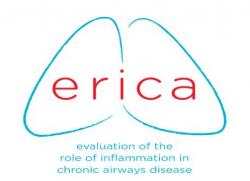
- Cardiovascular
- Trials closed
ERICA
Evaluation of the Role of Inflammation in non-pulmonary disease manifestations in Chronic Airways disease (COPD)
Research summary
COPD is the fourth leading cause of death globally and the only major cause that is predicted to increase in the coming decades. Although COPD is initially a pulmonary disease (traditionally caused by cigarette smoke, but increasingly by biomass fuel exposure), it is a complex condition in which outcome is in large part driven by cardiovascular and systemic components. Indeed, COPD is increasingly being recognized as a heterogeneous condition, involving extra pulmonary manifestations including reduced fat-free mass, muscle dysfunction, exercise limitation and increased cardiovascular morbidity.
The role of inflammation in COPD is well-recognised. A range of inflammatory markers and cytokines are raised in COPD subjects and relate to the severity of lung function and important clinical outcomes such as admission, cardiovascular events and death. Elevated fibrinogen (indicating a systemic ‘inflammatory’ phenotype) is a robust, stable biomarker that occurs in at least 25% of patients with COPD, and is associated with increased morbidity and mortality. Inflammation modulates large artery stiffness, an independent determinant of cardiovascular mortality, and anti-inflammatory therapies reduce arterial stiffness, providing a novel mechanism by which inflammation may drive cardiovascular risk. Inflammation is also thought to be related to muscle weakness, which is found in a substantial minority of patients with COPD and is associated with increased mortality. Indeed, reduced performance on a 6-minute walk test is associated with an increased risk of both death and admission with acute exacerbation of COPD.
Despite the associations between inflammation per se and cardiovascular and muscle outcomes, there are sparse data on how fibrinogen maps to other clinically measurable, bed-side biomarkers that have a more intuitive, or proven relation to cardiovascular and muscular outcomes, such arterial stiffness (pulse wave velocity), muscle strength (quadriceps maximum voluntary contraction) and exercise capacity (6-minute walk). Moreover, given the heterogeneity of COPD, it is unlikely that all patients will present with both cardiovascular and muscle manifestations of the disease. Although there is evidence of ‘cross-talk’ between cardiovascular and muscle aspects, the extent to which these manifestations overlap in COPD patients is unknown. However, a better understanding of the interplay between inflammation, muscle and cardiovascular structure and function will clarify the degree to which distinct COPD ‘sub-types’ can be identified. This is likely to result in more appropriate tailoring of therapies to individual patients; personalised medicine in practice.
This will be a multi-centre, observational, cohort study of patients with COPD. Five UK centres with an interest in COPD are undertaking this observational study. Patients will be assessed at baseline and followed-up by questionnaire every 6 months for up to two years or longer if TSB extension funding can be secured. Patients will be registered for long-term health outcomes through HES and MRIS. This is an observational study assessing a range of different biomarkers. The overall aim of this study is to identify new biomarkers in patients with COPD in order to stratify risk or entry into future trials of novel interventions.
Main inclusion criteria
-
Aged ≥40years
-
Able to provide consent
-
Clinical diagnosis of COPD
-
Post-bronchodilator spirometry FEV1/FVC ratio <0.7 and FEV1≤80% of predicted normal.
-
Current or ex-smoker with a smoking history of at least 10 pack years.
-
Clinical stability > 4 weeks from any exacerbation requiring treatment with oral steroids or anti-biotics or hospitalization
Main exclusion criteria
Patients will not be eligible for inclusion in the study if any of the following criteria apply:
- Lack of informed consent
- Pregnancy
- Current participation in an ongoing CTIMP
- Known diagnosis of alpha1 anti-trypsin deficiency
- Known neurological co-morbidities with skeletal muscle involvement
Funders and sponsors
Funders: GlaxoSmithKline
Sponsors: Cambridge University Hospitals NHS Foundation Trust and University of Cambridge
Chief investigator
Prof Ian Wilkinson
Contact details
Senior Research Associate: Dr Carmel McEniery
Email: [email protected]






